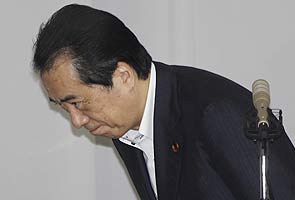
Kan's resignation perpetuates the high turnover in Japanese political leadership at a time when the country faces huge problems, including an aging population and sluggish economy - and now reconstruction from the worst disaster to hit the country since World War II.
In a nationally televised speech, Kan said he was stepping down as chief of the ruling Democratic Party of Japan, effectively ending his tenure as leader of the country. The decision was widely expected because in June, Kan had promised to quit once lawmakers passed three key pieces of legislation, the final two of which cleared the parliament earlier on Friday.
The Democrats will vote on Monday for a new leader, who will almost certainly become Japan's next prime minister - the sixth since 2006. Kan managed to survive only a few months longer than the four previous prime ministers, who each lasted a year or less.
Former Foreign Minister Seiji Maehara, a 49-year-old expert in defense and a China hawk, is viewed as the front-runner to replace Kan. Finance Minister Yoshihiko Noda and Trade Minister Banri Kaieda are also viewed as contenders.
Looking back on his year and three months in office, Kan said he did all he could, given difficulties he faced, including the disasters and a major election defeat in upper house elections last summer that left the parliament in gridlock.
"Under the severe circumstances, I feel I've done everything that I had to do," he said. "Now I would like to see you choose someone respectable as a new prime minister."
The 64-year-old Kan has seen his approval ratings tumble below 20 percent amid a perceived lack of leadership after the March 11 earthquake and tsunami, which led to meltdowns at three reactors at the Fukushima Dai-ichi nuclear power plant.
Survivors have complained about slow recovery efforts, and radiation has spread into the air, water and some foods. Radiation leaking from the plant has declined dramatically as workers try to bring the plant to a cold shutdown by January.
Many of the 100,000 people who were evacuated from around the plant live in temporary housing or shelter, and have no idea when they will be able to return to their homes. Accumulated radiation in some locations may keep them away for a long time, government officials have said recently.
Kan was at least partly undone by persistent political infighting, including within his own party. While the public hungered for political cooperation and vision in the wake of the crisis, parliamentary sessions frequently descended into squabbling matches that have disillusioned the public.
It was a no-confidence motion in June submitted by an opposition bloc that prompted Kan in June to promise he would resign in a desperate attempt to keep his own party members from joining the vote.
In the wake of the crisis, Kan urged Japan to become less reliant on nuclear energy, but his appeal did little to boost his image.
Contenders will officially declare their candidacy on Saturday, followed by a debate on Sunday and party vote on Monday. The new Cabinet is expected to be installed on Tuesday.
Kan urged the Democrats to seek unity as they pick a new leader. A key player in the process remains party kingpin Ichiro Ozawa, who still wields enormous influence even though he lost to Kan in the party leadership election last September.
"I hope to see this party become one, where everyone from the young to the veterans can discuss policy actively and freely, then cooperate and act as one," Kan said.
No comments:
Post a Comment